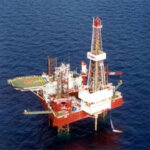Report: ‘System Safety’ Approach Needed for Offshore Oil Drilling

The regulation of safety in offshore oil drilling operations is a hot topic in Canada. For example, after Shell Canada recently won a bid to conduct deepwater oil exploration off Nova Scotia, calls for a separate safety agency independent of the federal-provincial offshore regulator were renewed.
Robert Wells, a retired NL judge, had recommended the establishment of a separate offshore safety agency after leading an inquiry into the March 2009 crash of Cougar Flight 491, which killed 17 people as it was ferrying offshore oil workers. But to date, the government has only said it’s talking with the federal government and counterparts in Newfoundland about these recommendations.
In the US, the Deepwater Horizon explosion and oil spill in the Gulf also raised issues about safety in offshore oil drilling operations. A new report on that incident from the National Academy of Engineering and National Research Council says that companies involved in offshore drilling should take a “system safety” approach to anticipating and managing possible dangers at every level of operation. It also recommends an enhanced regulatory approach that combines strong industry safety goals with mandatory oversight.
The report blames the lack of effective safety management among the companies involved in the disaster and regulators’ failure to exercise effective oversight for the tragedy and environmental mess.
For example, several signs of an impending blowout were missed by management and crew, resulting in a failure to take action in a timely manner. And despite numerous past warnings of potential failures of blowout preventer systems, both industry and regulators had a “misplaced trust” in the ability of these systems to act as fail-safe mechanisms in the event of a well blowout.
Other recommendations:
- Operating companies should have ultimate responsibility and accountability for well integrity because only they possess the ability to view all aspects of well design and operation.
- The drilling contractor should be held responsible and accountable for the operation and safety of the offshore equipment.
- Both industry and regulators should significantly expand the formal education and training of personnel engaged in offshore drilling to ensure that they can properly implement system safety.
- Guidelines should be established so that well designs incorporate protection against the various credible risks associated with the drilling and abandonment process.
- Regulators should identify and enforce safety-critical points that warrant explicit regulatory review and approval before operations can proceed.
The report did call the US Department of the Interior’s establishment of a Safety and Environmental Management Systems (SEMS) program, which requires companies to demonstrate procedures for meeting explicit goals related to health, safety and environmental protection, a “good first step” toward an enhanced regulatory approach.